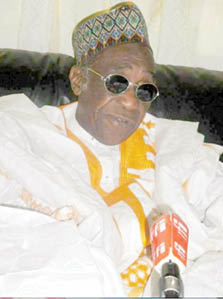The title of Danmasani was non-existent in Kano Emirate until Emir Muhammadu Sanusi (I) bestowed it in 1957 on Yusuf Maitama Sule, a former Nigeria’s Permanent Representative at the United Nations and also a former Minister of Mines and Steel Development.
Danmasani is a title given to a very knowledgeable person who would be advising the emir on legal (Sharia) matters and administration.
Danmasani is responsible for prayers in war time or when calamity falls or during a drought. The title, borrowed from Katsina, would play an important role in the rise to prominence of Kano Emirate, when Yusuf Maitama Sule was turbanned as the first Danmasanin Kano, while in the employ of Kano Native Authority as an information officer.
It is mainly a convention that a traditional title in palaces in northern Nigeria or the Sokoto caliphate would have meaning in Hausa and functional significance.
- Reps, stakeholders push for constitutional recognition for traditional rulers
- To preserve the institution, traditional rulers must be given roles — Prince Olusi
The Danmasani is not an exception to this convention. Other titles like Galadima, Yarima, Chiroma, Zanna and Kachalla cannot be directly translated in Hausa, because they originated from Kanuri or Borno Empire.
Some titles were derived from Arabic such as Waziri, Wali, and Matawalle, but despite their linguistic origins, their functions corroborate the meaning of the title. Danmasani suggests a knowledgeable person.
It is common practice that traditional titles can originate from one emirate or borrowed by another. Examples of these are numerous.
Kano Emirate, for instance, borrowed the title of Danmasani, Durbi and Sa’i from Katsina. The title of Waziri was taken from Sokoto, while Kaigama, Kachalla, Zanna and Bunu were originally from Borno. Wali, San Turaki and Katuka, are titles taken from Zaria or Zazzau Emirate.
Other emirates also took the title of Dan Isa, Dan Amar and Wambai from Kano.
The idea of borrowing a title is usually when the need arises to turban someone and there is no vacant title.
The Danmasani, though a traditional title holder, is not like other district heads, who have their titles and can be promoted. The title is traceable to ancient Katsina, during the rule of the descendants of the Habe ruler, Korau.
Some Arab emigrants were warmly received by the king and accommodated at an area called Masana, which, according to historical accounts, came to be known as Masanawa. Masanawa is a known ward in Katsina, where knowledgeable Malams reside. The King of Katsina, Usman Tsaga Rana (1504-1623) first appointed Abubakar Abdullahi Dan Abdulrahman as Danmasani. Abdulrahmannia, the leader of the Arab emigrants in Katsina and his descendants have been holding the title since then.
In Kano, the holder of the title of Danmasani has the rare privilege of attending palace court sessions and he is always present during Sallah, when district heads visit to pay homage. He also attends the traditional durbar.
The holder of the title must dress in traditional robes adorned with embroidery that symbolise his status and power.
The royal regalia associated with Kano palace and nobility, include Alkyabba, Falmaran (waistcoat), Zabuni (long sleeve version of Falmaran) and turban which can be shuni (dyed) or Dan kura or Hausa (white).
The royal tradition in Kano has high regard for rich and colourful attire, but the late Danmasanin Kano, Yusuf Maitama Sule, was, however, not keen on traditional durbar or particularly expensive royal regalia.
Ironically his father, Malam Abba Sule, was the Dan Mori of Madakin Kano Mahmuda. Sule was a skillful horse rider and in charge of royal costumes and the stockroom of the Madaki. His grandfather, Ahmadu, was similarly a close confidant of the Madakin Kano, Kwairanga, the famous warrior of the Yolawa Fulani clan, who helped build Kano as a state within the Sokoto caliphate.
A story was told about the Magajin Garin Katsina, Alhaji Kabir Usman (and later Emir of Katsina) who once mocked the Danmasanin Kano, Yusuf Maitama Sule, that his title was lowly rated in the hierarchy of the nobles. Maitama was disturbed and decided to register his displeasure to the Emir, Sanusi.
He took advantage of the emir’s tour of tax assessment of districts during which the Danmasani led a press team as the chief information officer of the Native Authority (NA).
Instead of dressing in the royal attire, Sule appeared in public dressed in a shirt and a pair of trousers; without a cap or turban. He also refused to eulogise the emir or play the royal music as was the practice.
After the tour, Danmasani was summoned to the palace by the emir but the conversation ended on a pleasant note when the emir offered to change the title for him. However, Maitama Sule remained the Danmasani and he reaffirmed his loyalty to the emir.
His son, Abdulkadir Yusuf Maitama Sule, succeeded him after the 14th Fulani Emir of Kano, Muhammadu Sanusi 11, in 2018, bestowed the title on him.
The title has been upgraded to be among the Yolawa title holders led by the Madakin Kano.
Noblemen with vast Western and Islamic knowledge can be appointed Danmasani, unlike Galadima, Wambai or Chiroma which, in Kano, are exclusively for the royal family (Yan Fulani). The title of Madaki is the exclusive preserve of the Yolawa.
Palace praise singers and courtiers eulogise and hail the Danmasani thus: ‘Magana taku zance naku’, literally translated as, “the power of speaking solely belongs to you”.
Contributors to the piece: Nasiru Wada Khalil, writer on Kano palace, Aminu Sani (Daga Zauren Masarautunmu) and Abdulkadir Yusuf Maitama Sule

 Join Daily Trust WhatsApp Community For Quick Access To News and Happenings Around You.
Join Daily Trust WhatsApp Community For Quick Access To News and Happenings Around You.

